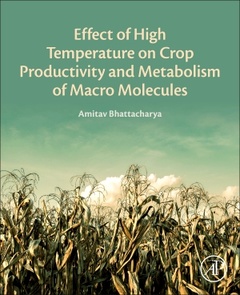Description
Effect of High Temperature on Crop Productivity and Metabolism of Macro Molecules
Author: Bhattacharya Amitav
Language: English
Subjects for Effect of High Temperature on Crop Productivity and...:
628 p. · 19x23.3 cm · Paperback
Description
/li>Contents
/li>Biography
/li>Comment
/li>
Effect of High Temperature on Crop Productivity and Metabolism of Macro Molecules presents a comprehensive overview on the direct effect of temperatures defined as "high", a definition which increasingly includes a great number of geographic regions. As temperature impacts the number of base growth days, it is necessary to adapt plant selection, strategize planting times, and understand the expected impact of adaptive steps to ensure maximum plant health and crop yield. Global warming, climate change and change in environmental conditions have become common phrases in nearly every scientific seminar, symposium and meeting, thus these changes in climatic patterns constrain normal growth and reproduction cycles.
This book reviews the effect of high temperature on agricultural crop production and the effect of high temperature stress on the metabolic aspects of macro molecules, including carbohydrates, proteins, fats, secondary metabolites, and plant growth hormones.
1. Effect of high temperature stress on crop productivity2. Effect of high temperature on carbohydrate metabolism in plants3. Effect of high temperature on protein metabolism in plants4. Effect of high temperature on fat metabolism in plants5. Effect of high temperature on metabolism of secondary metabolites in plants6. Effect of high temperature on metabolism of plant growth hormones
- Focuses on the effects of high temperature on agriculture and the metabolism of important macro-molecules
- Discusses strategies for improving heat tolerance, thus educating plant and molecular breeders in their attempts to improve efficiencies and crop production
- Provides information that can be applied today and in future research
These books may interest you

Crop Responses to Global Warming 105.49 €

Crop Responses to Global Warming 105.49 €


